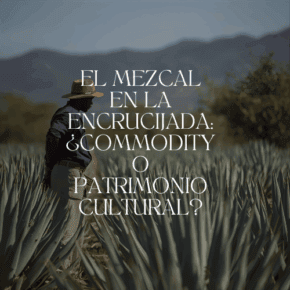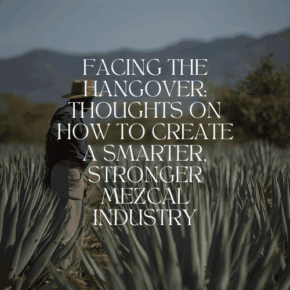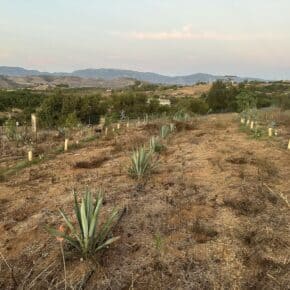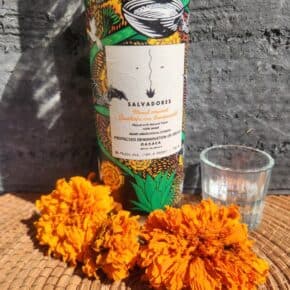
The evening before this year’s Mezcal: Mexico in a Bottle San Francisco we hosted a panel titled “What We Talk About When We Talk About Sustainability” to dig into the raft of questions about sustainability in the mezcal industry. Aside from our debt to Raymond Carver the panel was inspired by the consistent questions from drinkers and bartenders throughout the world about how mezcal can be made in a way that ensures environmental, cultural, and economic sustainability.
The topic comes up in almost every conversation and since we had a team of brand heavyweights in town the moment was ideal for the discussion. Susan Coss moderated the discussion between Judah Kuper from Vago, Raza Zaidi from Wahaka, and Ivan Saldaña from Montelobos. We were also privileged to host many other brand representatives in the audience including Fidencio’s Arik Torren, Erick Rodriguez, William Scanlan, and more.
As a sad side note, this was one of the last nights of service at La Urbana which closed suddenly just two days later.
Where your agave comes from and why that’s important

Susan started the conversation by asking each participant to talk about how they approach sustainability in relation to their agave supply exactly because it’s something that everyone approaches with such a different perspective. Judah jumped right into it with this statement “my bold and crazy idea is the we need to ween industry off wild agave. It’s my radical proposal, why don’t we all just commit to doing that? We could do that right here, right now.” He is already taking Vago in that direction with a huge reforestation project that means almost all of his mezcals will soon be made from cultivated agave.
Raza Zaidi’s rejoinder was that just jumping off the wild agave train immediately is unrealistic. His thinking is that “capitalism will take it’s toll, we’ll get there, but it’ll be in a zig-zag pattern.” Wahaka is working on reforestation experiments, especially through the Fundación Agaves Silvestres which focuses on replanting 30-40% of the agaves they harvest. But ultimately his blunt, saddening, and deliberately provocative summation of Wahaka and the mezcal industry’s position is that “we are not a sustainable company.” Part of the issue is demand because mezcal aficionados prize silvestres, part of it its the complex nature of land holding arrangements in Mexico, and of course part of it is the economics of the industry.
Ivan Saldaña’s thinking is very straightforward. He frames it like this: “I took the easy, comfortable, decision not to use silvestres.” He designed Montelobos to be a growth business so he modeled out their supply chain and found that the only successful path was to build the business around cultivated agave reproduction rates. “You need to model the population because it’s one thing to drink a rare mezcal in Oaxaca, another to bottle it and send it around the world.” Meaning that there are two distinct businesses and in order to make mezcal into an exportable product his choice was pretty easy, he had to be sustainable from the start just to make sure that all the espadín he’d need to fulfill demand would be ready for harvest today and seven years from now.
Wood and the DO: Pull a thread – get a national tapestry

But agaves are only part of the issue. Once you start digging into how to define sustainability you find a lot of open questions, some partially answered, some not even asked. Take one of the biggest in the industry; wood. Traditionally when you’re distilling mezcal you burn wood while roasting the agaves and when firing the still. As the mezcal industry has grown that’s meant demand for wood has spiked to the point that it has grown to cost more than agave. Take a minute to think about that.
Burning all that wood causes all sorts of sustainability issues – you’re putting carbon back into the environment, you can’t assume that new trees are being planted to replace those that were burnt so there isn’t necessarily a carbon sink to make up for the wood that was burnt, and a few more. Susan wrote a piece about it recently in anticipation of this panel which is worth reading to get your head around the complexity of the issue. It’s not that brands aren’t trying to ameliorate the situation, as an example Judah jumped in to to point out that Vago is trying to plan 1,000 trees a year, it’s that the problem is being compounded by general business growth and the way the mezcal business is being defined.
Wood is so central to how mezcal has been traditionally made that you are required to use it while roasting the agave and firing your still in order to qualify as either “ancestral” or “artisanal” in the new Denominación definition. That means that the DO is writing pollution into the law. Raza pointed to a quick sustainability win “it’s a no brainer, switch to gas fired stills but not the agave roasting.” At a stroke you’ll remove one huge polluter and make a huge contribution to a more sustainable industry. But since burning wood is written into the DO and the market incentives to get yourself labeled an “ancestral” or “artisanal” mezcal are huge – I mean, wouldn’t you really rather call yourself the ‘Artisanal Mezcal’ instead of just “Mezcal”? So, everyone is going to have to keep polluting just to comply with the law and sell their product at the premium it deserves.
Whose responsibility? Sustainability as ethical football

As the panel and audience were kicking these ethical footballs around, Ivan made a pretty blunt point that goes to the heart of this whole sustainability question. He said “Everywhere in the world consumers are looking for perfect answers so that they won’t feel guilty.” That’s the nutshell version of ethical shopping.
Ivan wasn’t really trying to shift all the blame to consumers, it’s another way of stating the problem because everyone really does want to do the right thing. But that desire for a simple certification that will magically make it all alright is just too simple. Sure, having something like Whole Foods’ certification standards has made incredibly positive changes but that’s not a magic wand, especially for a situation as complex as the mezcal world.
Developing on that thought Ivan said “It’s more complex than that, you have to ask ‘what’s the risk?’ ‘how do we quantify risk?’ We have to find solutions – I hate the pure marketing solutions that show a picture of a beautiful Oaxacan village where perfect people exist… You can’t reduce it to that.” Or to go back to something Ivan said earlier, perhaps we should retitle the panel “Sustainability: It’s Not Easy.”
It’s not all doom and gloom
None of this is to say that we face a hopeless situation. The fact that we had this conversation at all, that it was open to the public, that everyone was engaged, and that many brands are already taking action speaks volumes. And it’s not like your every day mezcal drinker is powerless either. The consumer revolt against the original NOM 199 was a major factor in the less than perfect resolution of that fiasco.

In fact both Raza and Ivan were pretty sanguine about the power that mezcal drinkers bring to this whole debate partially because both of them hold such dim views of the Mexican government’s ability to contribute to a solution. Raza pointed a finger at endemic political corruption and the myopic political focus on major industrial players at the expense of everyone else while Ivan noted that the very idea of responsive political authority is a really “American sort of thing.”
The hope that Ivan sees is exactly that brands are dynamic actors determining their own destinies. “I think it’s more about brands figuring it out among themselves.” And Raza made it really clear that many mezcal brands are very different from your typical companies because they focus on transparency – their labels focus on disclosing everything about their product because they know that information is really important to consumers. And their whole process is transparent is as well. Raza brought up a really critical point, “open palenques are really important, the process is open, you can go and see how it’s done.”
This degree of transparency combined with the level of engagement in this topic means that we will definitely see more progress in this area. We’ll be reporting back on more ideas soon because it’s clear that we can help with the process and guiding the discussion.












Sounds like an interesting evening. Wish I had been there. The aspect of the wood burning was new to me.